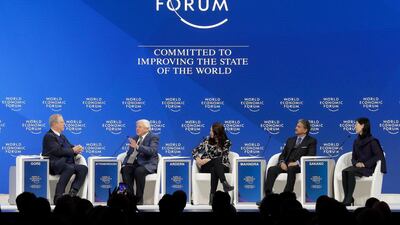The sight of former British prime minister Tony Blair shivering with cold as he walked out of the Congress Centre and onto the promenade in Davos seemed an apt metaphor for where his generation of global leaders have found themselves today. At the World Economic Forum, there has been a real sense of a changing of the guard as a youthful energy takes over the discussion of how to resolve many of the world's most pressing problems, including climate change, the fate of refugees and, not least, anaemic economic growth.
The forum has chosen six people under the age of 30 to be among the event's co-chairs this year. Each is impressive in their own right. Iraqi architect Basima Abdulrahman advocates for sustainable and green investing; Colombian social entrepreneur Juan David Aristizabal is working at a grassroots level to give young people the skills they need for the jobs of the future; Noura Berrouba will surely be prime minister of her native Sweden one day; Akira Sakano is proving in her rural town of Kamikatsu in Japan that it is possible to live with zero waste. Julia Luscombe is another young leader, determined to shine a light on the 40 million Americans facing hunger, including one in six children, a shocking statistic for the world's largest economy. Then there is Somalian refugee Mohammed Mohamud, who wants equal opportunities for the 185,000 people living in his camp in Kenya.
Apart from youth, what they all have in common is that their accomplishments and passion for change have been driven as much by the failures of previous governments as anything else. Over the last decade, successive policies – monetary, economic and social – have failed to deliver any real respite from the consequences of the financial crisis. Loose monetary policy and the printing of massive amounts of money by central banks to prop up the financial system following the credit crunch has only served to postpone the inevitable. We have also lurched from crisis to crisis; from Europe to the Middle East, Africa, the Asia-Pacific and the Americas, no part of the world has been immune from the effects of an addiction to debt and leverage.
Today the vision is for a more sustainable version of globalisation. In Davos this week, thousands of executives, officials and experts are contributing to the debate, tackling a broken system and working on a new blueprint for trade, commerce and the sharing of technology.
Before arriving here, I had been hit with a heavy dose of pessimism about the global economic outlook from various quarters of the business world. Many executives fear that we are only now beginning to deal with the consequences of 2008 as the era of easy money finally unwinds in Europe and China’s economic growth slows. They see a prolonged recession on the horizon. They could be right. Equally, it might also become a self-fulfilling prophecy as concerns about the future compel businesses to hold back on investments and expansion plans.
Those that led the response to the crisis a decade ago could be forgiven for doing what they thought was best. However, looking back there is a feeling that many of them – among them Hank Paulson, then US treasury secretary, for example, now in academia – fostered a culture of denial. They panicked when they saw the reaction to letting investment bank Bear Stearns go to the wall, which was the correct decision. Policymakers in the US and western Europe chose the short-term decision of bailing out the financial sector. Ultimately, jobs were lost everywhere, not just in banking, and wages have remained suppressed.
Opportunities for young people have been relatively limited. In the Middle East, the situation triggered the Arab uprisings. The Bric nations – Goldman Sachs’ name for the grouping of emerging economies of Brazil, Russia, India and China – which we had been certain would continue to drive economic growth, even if the US stuttered, are each still coping with the fallout in different ways. In Brazil, as in India, a populist, nationalist government has been elected. Russia is once again a pariah in the West.
Frankly, things have been bleak in the last few years. Yet here we are at the start of 2019 and a dynamic force has gripped Davos. Those six young co-chairs are symbolic of a new and highly ethical generation that now find themselves at the heart of the process to create a better future, one based on long-term benefits and not just on immediate political realities.
As Ms Berrouba put it on Tuesday, an “informed and empowered young generation is needed” to hold today’s leaders accountable on the issues that matter most.
Mustafa Alrawi is an assistant editor-in-chief at The National


